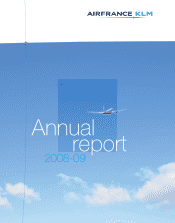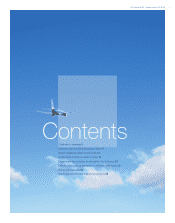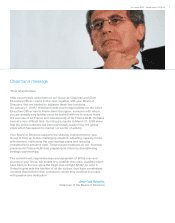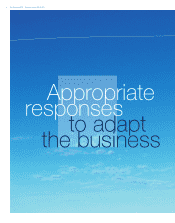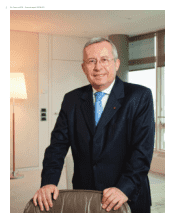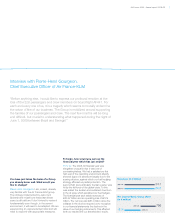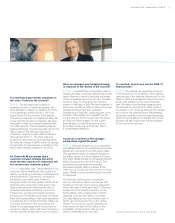Air France 2009 Annual Report Download - page 11
Download and view the complete annual report
Please find page 11 of the 2009 Air France annual report below. You can navigate through the pages in the report by either clicking on the pages listed below, or by using the keyword search tool below to find specific information within the annual report.
You mentioned appropriate responses to
the crisis. Could you tell us more?
P.-H. G.: The first response consists of
adapting the offer to declining demand. We
have decided to reduce our capacity by 4.5%
in the passenger activity and by 11% in the
cargo activity for the Summer 2009 season.
The second response is to adjust the fleet plan
in line with this reduction in capacity. We have
negotiated a deferral in aircraft deliveries with
our OEM partners. This rescheduling has the
added advantage of preserving cash during this
difficult period. We are thus reducing our
investment program by €2.9 billion between
last year and 2010-11. The third response
consists of reinforcing our cost-savings plans.
We have set a target of €600 million of savings
for the 2009-10 financial year, in addition to the
€675 million already achieved in 2008-09.
Air France-KLM has always had a
customer-focused strategy. Does this
mean that the reduction in investment will
not concern your customer policy?
P.-H. G.: Absolutely right. The investment in our
customer offer is maintained. We continue to
deploy our range of e-services to streamline the
travel experience. This autumn, we shall be
launching a new cabin class, Premium
Voyageur, which will offer greater comfort at an
attractive price. During this crisis period, this
class is also aimed at stemming the flow of
business passengers switching to economy.
Furthermore, we have introduced innovative
services for our Première customers, providing
them with a personalized, fast-track experience
on departure as on arrival and when making an
on-bound connection. We must secure the
loyalty of our passengers and induce them to
choose our flights, which offer them the level of
comfort and service they have come to expect.
Have you changed your hedging strategy
in response to the decline in the oil price?
P.-H. G.: I would first like to emphasize that our
hedging strategy of the past decade has proven
highly effective in terms of reducing the impact
of the progressive rise in the oil price. The latter
took four years to reach $140 but only four
months to fall back to $40! We have adapted to
these new conditions, firstly in taking on no new
hedging contracts and then, between
December and February, unwinding part of our
portfolio. This enables us to benefit from the
current oil price which is lower than the prices
at which we were hedged. For the current
financial year, our fuel bill should be some
$1.5 billion* lower than in 2008-09. That is
a considerable difference.
Could you comment on the strategic
partnerships signed this year?
P.-H. G.: We have stepped up our cooperation
with Alitalia thanks to an operational partnership
agreement, cemented by a 25% equity stake.
This agreement gives us privileged access to
the Italian market, the fourth largest in Europe,
and offers Alitalia access to the leading network
linking Europe to the rest of the world. This
partnership should generate synergies
estimated at €360 million, of which €160
million for our Group over the next two to three
years. Alitalia is currently performing in line with
its objectives.
We have also reinforced our cooperation
with our US partner Delta, now merged with
Northwest, through a joint-venture agreement
which has been in force since April 1. We have
created the most powerful operator on the
North Atlantic with a market share of 25%,
revenues of around $12 billion, more than
200 daily flights and six coordinated hubs of
which two in Europe and four in the United
States. For our Group, we are expecting an
improvement of about $150 million in the
profitability of this network. This is a tool
which is well-adapted to the crisis.
To conclude, how do you see the 2009-10
financial year?
P.-H. G.: The experts are expecting an upturn
in the economy in 2010 based on the ongoing
restructuring of the banking industry and on the
effects of stimulus packages however we have,
as yet, little visibility on the current financial
year. We expect cost-savings measures and
the reduction in the fuel bill to offset much of
the decline in our revenues although we will still
be in loss at the operating level. Nevertheless,
we remain confident since the responsiveness
which should enable us to weather the current
situation will also ensure that we are prepared
for the economic recovery.
* Based on the forward curve of June 12, 2009: $70/bbl.
9
Air-France KLM - Annual report 2008-09

